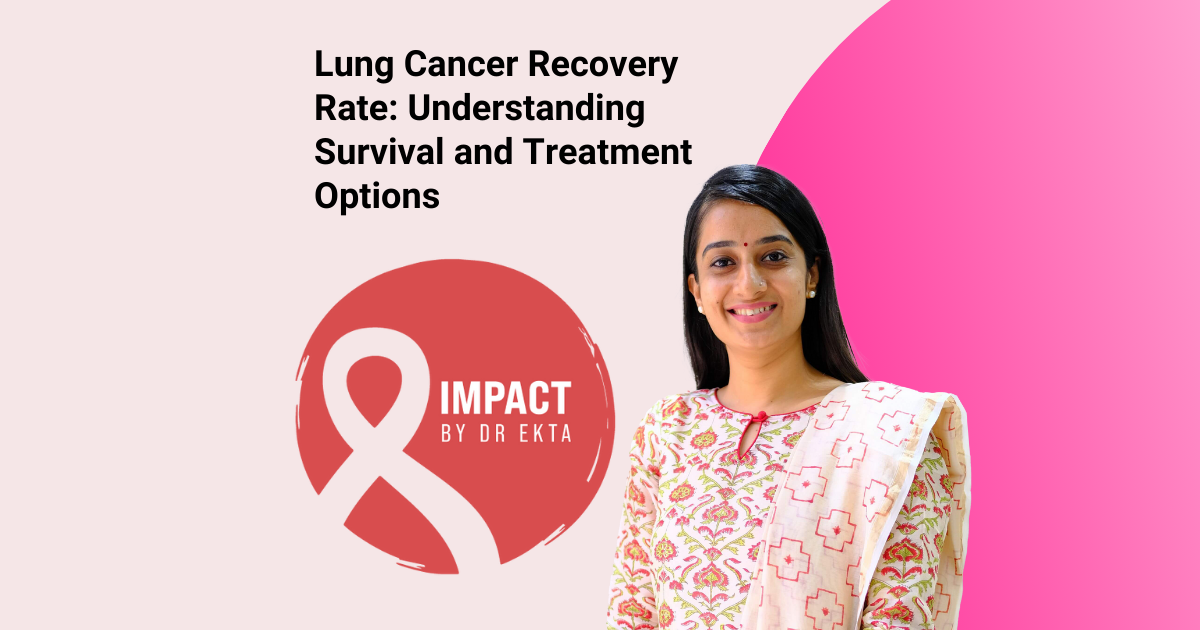As an oncophysician deeply immersed in the realm of cancer care, I’m committed to illuminating the path to recovery for lung cancer patients across India. Join me as we delve into the complexities of lung cancer survival, explore treatment options, and empower individuals with the knowledge needed to navigate through diagnosis, treatment, and beyond.
Exploring Lung Cancer Recovery Rate
Understanding the lung cancer recovery rate involves grasping its significance beyond mere statistics. It’s a beacon of hope, representing the resilience and determination of those facing this formidable disease. However, it’s crucial to remember that these rates are statistical estimates and may not fully capture the individual journey of each patient.
Survival Trends Over Time
Over the years, we’ve witnessed remarkable advancements in early detection methods, treatment modalities, and supportive care, leading to improvements in survival rates globally. Yet, disparities persist, especially in regions like India where access to healthcare resources may be limited. Despite these challenges, progress continues, offering hope for better outcomes in the future.
Trends in Survival Disparities
Socioeconomic factors play a significant role in shaping survival outcomes. Efforts to bridge these gaps through initiatives such as subsidized healthcare programs and community outreach are essential for ensuring equitable access to quality care. By addressing these disparities, we can strive towards improving overall survival rates and promoting health equity.
Emerging Treatment Approaches
The landscape of lung cancer treatment is evolving rapidly, thanks to innovations like targeted therapy and immunotherapy. These groundbreaking therapies offer new hope for patients with advanced lung cancer, targeting specific genetic mutations or enhancing the body’s immune response against cancer cells. However, challenges related to availability and affordability persist, particularly in resource-constrained settings like India. Efforts to expand access to these treatments and reduce barriers to care are essential for improving lung cancer recovery rates.
Impact of Lifestyle Factors
Beyond medical interventions, lifestyle factors can profoundly influence recovery rates. Smoking cessation programs, healthy habits, and psychosocial support services are integral components of comprehensive cancer care. By addressing these factors holistically, we can enhance the overall well-being of lung cancer patients and improve the chances of lung cancer recovery.
Psychosocial Support
Addressing the emotional needs of patients is paramount for promoting recovery and enhancing quality of life. Support groups, counseling services, and palliative care resources offer invaluable support throughout the treatment journey. By integrating these support services into standard cancer care protocols, we can positively impact lung cancer recovery rates and overall patient well-being.
Research and Innovation
Continued research and innovation are essential for advancing lung cancer care. Clinical trials investigating new treatment modalities, predictive biomarkers, and personalized medicine approaches hold promise for improving outcomes for lung cancer patients. Encouraging participation in clinical research and fostering collaboration between researchers, healthcare providers, and patient advocacy groups are essential steps toward advancing lung cancer care in India and globally.
Factors Influencing Survival Rates
From the cancer stage to access to treatment, numerous factors influence survival rates. In India, late-stage diagnoses and disparities in healthcare access can impact these rates significantly. By addressing these factors and implementing strategies to improve early detection and access to care, we can strive towards better outcomes for lung cancer patients.
Understanding Survival Statistics
Interpreting survival statistics requires careful consideration of the healthcare landscape. While specific data for India may be limited, efforts to improve cancer registries are underway to gather more accurate survival data. By understanding the nuances of survival statistics and their implications, healthcare professionals can better inform patients and tailor treatment approaches to individual needs.
Treatment Options
Treatment for lung cancer is multifaceted and tailored to individual patient needs. Surgery, chemotherapy, radiation therapy, targeted therapy, and immunotherapy are among the key modalities used in the fight against this disease. By offering a multidisciplinary approach to treatment and considering the unique characteristics of each patient’s cancer, we can optimize outcomes and improve lung cancer recovery rates.
Conclusion: Empowering Patients with Knowledge
Navigating lung cancer is a complex journey that requires a comprehensive understanding of various factors. By arming ourselves with knowledge, embracing a multidisciplinary approach to treatment, and advocating for equitable access to care, we can empower patients to confront this disease with courage and resilience. Together, we can make a difference in the fight against lung cancer, offering hope and support to those in need.

